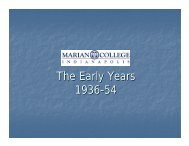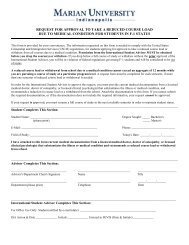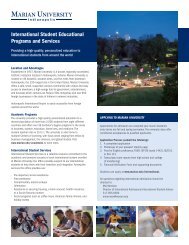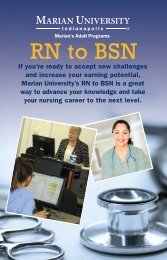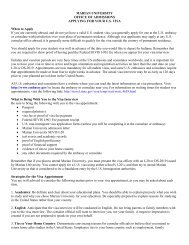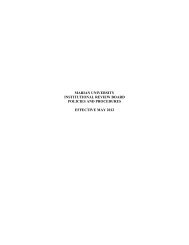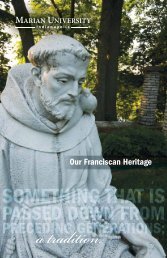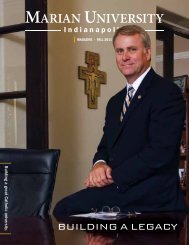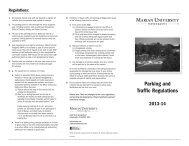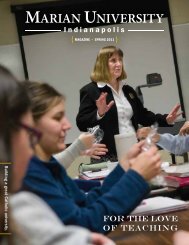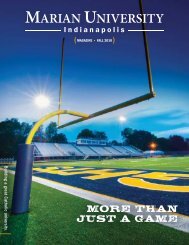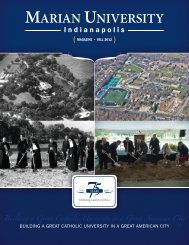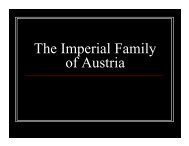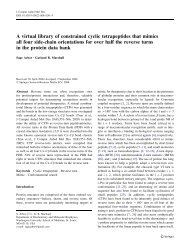2009-11 Marian University Course Catalog, fall 2010 edition
2009-11 Marian University Course Catalog, fall 2010 edition
2009-11 Marian University Course Catalog, fall 2010 edition
Create successful ePaper yourself
Turn your PDF publications into a flip-book with our unique Google optimized e-Paper software.
psychology, or sociology major to earn a license as a high<br />
school social studies teacher.<br />
Secondary education minors must consult the School of<br />
Education for specific Indiana requirements. Students are<br />
expected to meet with their content advisor and the Director<br />
of Secondary Education prior to registering for any courses.<br />
Students must meet the developmental licensing standards,<br />
as specified by the Indiana Professional Standards Board.<br />
<strong>Course</strong> requirements for students minoring in secondary<br />
education:<br />
1) General education as required for the bachelor degree.<br />
2) Major requirements with any additions needed for a<br />
teaching major in a subject area. Some content area<br />
majors require additional courses to meet content<br />
standards. Students should contact the School of<br />
Education for specific additional courses in the major<br />
or minor area.<br />
3) Professional education courses and student teaching:<br />
120, 164, 230, 351, 446, 454, 456, and student<br />
teaching.<br />
4) Additional required courses are PSY 101 and 365.<br />
5) Students must meet the 2.50 GPA requirement in all<br />
areas of licensure and earn a minimum grade of “C” in<br />
all courses in the major and minor.<br />
6) Specific and continuing pre-student teaching field<br />
experiences in<br />
selected courses.<br />
7) Completion of all phase assessments including PRAXIS I<br />
and PRAXIS II testing in all majors and minors which<br />
will be licensing areas.<br />
Middle School Licensing Addition<br />
Students may add a middle school license to either the high<br />
school or the primary/intermediate license. There is no standalone<br />
middle school licensing. Students must complete the<br />
same phase assessments as described in this section to be<br />
recommended for middle school licensing.<br />
Students in the elementary education program pursuing the<br />
middle school license must complete the requirements for a<br />
teaching minor in one content area and pass the staterequired<br />
middle school or content area PRAXIS II exams.<br />
Currently, a middle school license is available in<br />
English/language arts, science, mathematics, social studies,<br />
foreign language, art, music, and health/physical education.<br />
Additional coursework for elementary education majors<br />
includes 163, 168, 263, 352, 457, 458, 465, an academic<br />
minor, and may require an extra semester to complete.<br />
Additional coursework for secondary education minors<br />
includes 163, 168, 263, 352, 457, 458, and 465, and may<br />
require an additional semester to complete. Contact the<br />
School of Education for current requirements.<br />
All courses are subject to change based upon current<br />
requirements from the School of Education and the Division<br />
of Professional Standards, Indiana Department of Education.<br />
K-12 licensure<br />
Health and Physical Education, Art, Music, Spanish and<br />
French are approved by the Division of Professional Standards<br />
for Kindergarten through grade 12 licensure. The required<br />
education coursework to obtain this license in any of these<br />
content areas is as follows: 221, 230, 315, 446, 456, 457, 458,<br />
462 or 463, 465 or 466, PSY 220 and 365. Specific content<br />
requirements for the licensure area must also be met as well<br />
as all Phase assessment requirements.<br />
Concentration in Faith-Based Teaching: The Catholic School<br />
Educator Preparation Program<br />
Students committed to faith-based teaching have the<br />
opportunity to nurture their own faith as they develop into<br />
teachers. The Catholic School Educator Preparation Program<br />
(CSEPP) parallels the traditional program but emphasizes the<br />
role of the faith-based teacher to help children develop their<br />
spiritual lives. CSEPP is made possible by funds from the<br />
“Rebuild My Church” program, a Lilly Endowment Inc.-funded<br />
project to promote faith and vocation at <strong>Marian</strong> <strong>University</strong>.<br />
Students are assigned to the same Catholic school for all<br />
practical in selected methods courses throughout their<br />
coursework. Students complete the School of Education’s<br />
phase assessments as part of the Catholic School Educator<br />
Preparation Program.<br />
Completing this program leads to a concentration in faithbased<br />
teaching. Students complete additional coursework in<br />
theology: THL 105S, 106S, 270, 361, and EDU 400. Their<br />
coursework focuses on:<br />
• creed of the church<br />
• liturgy of the church<br />
• sacraments of the church<br />
• Old Testament<br />
• New Testament<br />
• the person of Jesus Christ<br />
• praying with children<br />
• catechism of the Catholic Church<br />
• teaching of religion<br />
• mission and history of Catholic schools<br />
In their first year, students visit all school sites and meet<br />
each semester to discuss their own commitment to<br />
becoming faith-based teachers. They take EDU 400,<br />
Mission and History of Catholic Schools, with veteran<br />
teachers in the Archdiocese of Indianapolis. During their<br />
second and third years, they take directed theology<br />
courses, as well as methods courses, and they participate<br />
in a practicum to teach religion. Student teaching takes<br />
place at the mentor school during the appropriate<br />
semester.<br />
56



